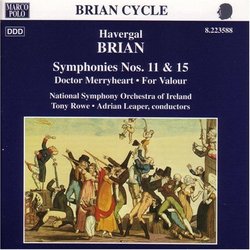| All Artists: Brian, Rowe, Leaper Title: Symphonies 11 & 15 Members Wishing: 0 Total Copies: 0 Label: Marco Polo Release Date: 2/22/2000 Genre: Classical Styles: Forms & Genres, Theatrical, Incidental & Program Music, Instruments, Keyboard, Symphonies Number of Discs: 1 SwapaCD Credits: 1 UPC: 730099358828 |
Search - Brian, Rowe, Leaper :: Symphonies 11 & 15
 | Brian, Rowe, Leaper Symphonies 11 & 15 Genre: Classical
This seventh volume of Marco Polo's survey of Havergal Brian's symphonic works contains two concert overtures from early in his career and two of the symphonies from his productive old age. For Valour, from 1906, wears its... more » |
Larger Image |
CD DetailsSynopsis
Amazon.com This seventh volume of Marco Polo's survey of Havergal Brian's symphonic works contains two concert overtures from early in his career and two of the symphonies from his productive old age. For Valour, from 1906, wears its Elgarian influences lightly; Brian was already finding his own prickly voice. Doctor Merryheart, of 1912, is a set of heavily programmatic variations, along the lines of Strauss's Don Quixote, which vividly evoke the dreams and misadventures of an absent-minded astronomer. The two later symphonies, from 1954 and 1960, are typically terse Brian utterances--the expressive opening adagio of Symphony No. 11 unveils a world of sorrow in six minutes. Leaper, in particular, has made something of a specialty of Brian and understands his inventive and idiosyncratic sound world well. These are performances that set out to make a case for an original musical thinker and are clear in their sense of his eccentrically ordered structures. --Roz Kaveney Similar CDs
|
CD ReviewsSignificant composer, still underrated Scott Chaiken | San Antonio, TX | 08/04/2002 (5 out of 5 stars) "Brian's symphonies are in the same league as any other composers' in the 20th century, in my opinion. To be fair to Brian detractors, his music has flaws (or more commonly can be poorly interpreted); however, Brian makes up for that with the mass of musical ideas he usually puts in his music. He was something of a nostalgic romantic and was fully dedicated to (a very adept at) tonality, but he also had an extreme bent towards the experimental and the modern. On this CD you get 77 minutes of works spanning a 60-year period of Brian's life. "For Valor" (1906) does sound a lot like movie music, but if you like Korngold or Williams, you'll probably like this. Elgar is probably the closest comparison. The second early work (1912) is an interesting (Rickard) Straussian satire (perhaps more homage than satire). More modern are the Symphony no. 11 and Symphony no. 15, written 50 years later. Parts of the 11th remind me of Mahler (at least in the first 2 movements), and the opening Adagio really does rank as some of the best slow music Brian wrote, although you will not necessarily appreciate this in the first few listens. Symphony no. 15 reminds me of Mozart in sensibility (i.e. classical structure and very felicitous themes) but with plenty of modern idiom. It is also a youthful and rambunctious work (written at a spry young age of 84). So why is Brian so hard to get? Some blame it on his "ellipsis" which suggests Brian only partially presented a musical idea and expected the listener to fill in the rest. However, I would tend to blame it on his self-imposed terseness, a necessity given the number of musical ideas this composer typically likes in his symphonies. A lot of ideas means you can't spend much time developing any one of them, and once they are expressed, Brian moves on. This doesn't characterize all of Brian's music (or symphonic movements), but I think it may explain why initial listens to some of his more "compressed" work sound chaotic and poorly structured. However, subsequent listens have always repaired that (at least for me). This is an excellent introduction to previously unfamiliar and important Brian. I'd also like to encourage the re-release of Brian recordings: Symphonies 8 and 9 (Sir Charles Groves), Symphonies 6 and 16 (Myer Fredman), and Symphony no. 7 (McKerras). Just this sampling alone reflects a very broad range of both symphonic development and creativity that is rare among the "average" great composer."
|

 Track Listings (28) - Disc #1
Track Listings (28) - Disc #1



